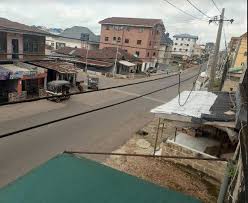The Indigenous People of Biafra (IPOB)-enforced sit-at-home protests, which began in August 2021 to demand the release of leader Nnamdi Kanu, have crippled Southeast economy and security, inflicting N7.6 trillion in losses and claiming 776 lives, according to a new report by SBM Intelligence. The weekly lockdowns, initially symbolic, have devolved into a violent crisis, paralyzing commerce, education, and transportation while fueling militia activity.
Key commercial hubs like Onitsha and Aba bore the brunt, with the transport sector alone losing an estimated N13 billion daily at the peak of the protests. Supply chains collapsed, businesses shuttered, and students missed critical national exams like WAEC and NECO due to recurring closures. Though IPOB claims compliance is voluntary, fear of attacks by “unknown gunmen” enforcing the order has driven most adherence, with only 29% of residents actively supporting the directive.
The report linked 332 violent incidents between 2021 and 2025 to the unrest, with Imo State recording the highest casualties (332 deaths from 130 attacks) followed by Anambra (202 deaths). IPOB’s Eastern Security Network (ESN), initially formed to combat rural insecurity, has been implicated in assaults on security forces and infrastructure, worsening regional tensions. Annual fatalities surged from 137 in 2021 to 313 in 2024, with 75 deaths already reported in 2025.
SBM Intelligence warned that the protests’ evolution into a prolonged crisis threatens long-term economic recovery and social stability, urging coordinated interventions to address grievances and restore security in the Southeast.




